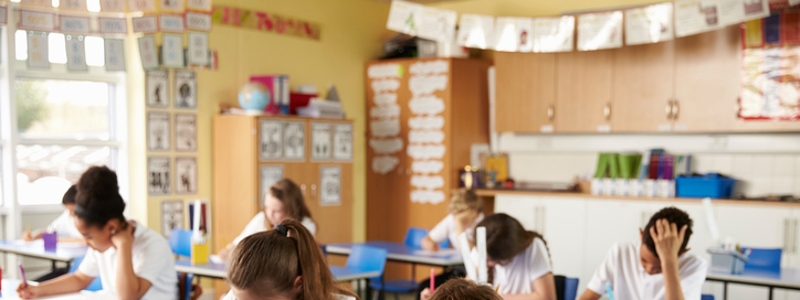Even though the pandemic is far from over, the impact of COVID school closures, remote learning and isolation periods has been great. In fact, with the latest research finding that the average student is roughly two to three months behind in maths and one month behind in reading- COVID learning loss is certainly a real thing. Not only has COVID affected learning but broader health and well-being concerns too, with more than 35 percent of parents reporting that they’re concerned about their children’s mental health. Here’s some more information on the effect COVID learning loss has had on students.
Pupils lost on average a third of learning time.
Researchers from the London School of Economics and Political Science (LSE) and the University of Exeter, found that learning loss varied across the four nations: pupils in England and Northern Ireland lost 61 days of schooling on average between March 2020 and April 2021. However, in Scotland, pupils lost 64 days and in Wales, it was 66 days. With the usual school year being 190 days and even taking into consideration the learning undertaken both at home and in the classroom, pupils on average lost around a third of the learning they would have benefited from if the pandemic had not happened.
Learning losses appear to be most prevalent in maths and literacy.
Ofsted reports from the 2021 autumn term indicates that students were most behind in their maths and literacy skills. In fact, it has been found that learning losses in maths were greater than any other subject. It’s estimated that on average, pupils in primary schools have experienced a learning loss in maths of around three months.
There’s been a huge impact on student’s general mental health and wellbeing.
Like so many adults, many children and teens found the transition to life in lockdown difficult, particularly from a mental health and well-being perspective. There were many factors involved such as living under lockdown restrictions, online school and being unable to socialise with friends, that were reported as detrimental to students’ mental health, well-being and desire for learning.
Increased screen time caused students burnout, stress and demotivation.
Open Data Institute (2020) found that many students reported that increased screen time associated with online schooling led to headaches, burnout and stress. Although many reported enjoying the flexibility of offline learning, the lack of structure and routine was difficult to navigate. For example, some students reported being unmotivated or having no discipline to study, while others, particularly girls, lacked the discipline to restrict learning to normal school hours and often worked longer than they would usually, compared with boys.
Learning loss for pupils from disadvantaged backgrounds and deprived areas is higher.
Gov.uk found that pupils from disadvantaged backgrounds (those eligible for free school meals at some point over the last 6 years) have consistently lost more learning than their more affluent peers throughout the course of the pandemic. As well as individual pupil disadvantage, pupils living in the most deprived areas saw the largest losses overall, with 3 months lost in maths and 1.2 months in reading at primary, and 2.7 months in reading at secondary.
For more detailed information, the resources and studies below provide in-depth reports on the impact of COVID learning loss.

